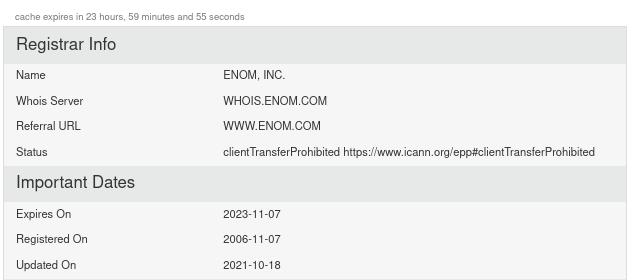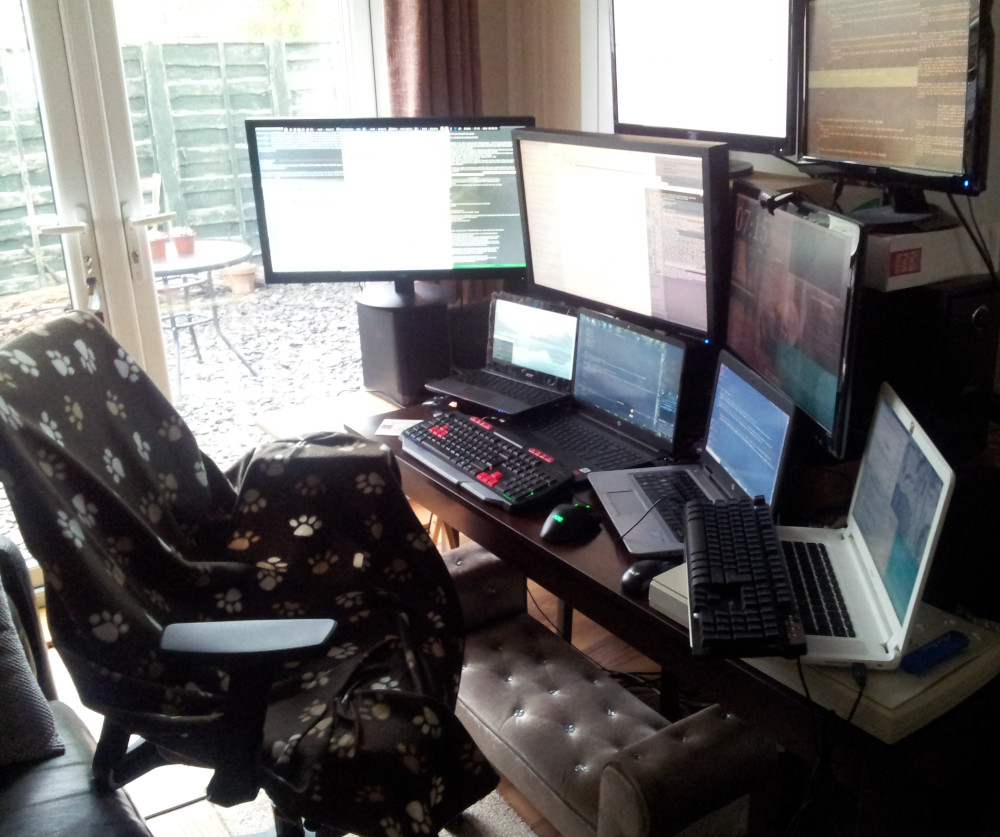Now Working Even More on the Web Sites
I left my job in December, one month after Techrights had turned 16 (it was known as “BoycottNovell” at first). Yesterday the site turned 16.5 — a fact that I only realised about an hour ago. Here’s “whois“:
Summary: Another small (or semi) milestone for us; it’s an opportunity for reflection
The site started when I was 24. I was a student at the time. I had begun writing my thesis months earlier and I didn’t feel eager to find a job in some centralised office. In 2007 I started working from home exclusively and that hasn’t changed since. The working environment evolved and improved over the years. When working in front of a computer it’s important to make things pleasant and last year I moved everything to a dedicated room, formerly the dining room. Here’s what it looks like this morning (minutes ago; I’ve since then added a plant to the beige table on the left, as there’s available space there).
The photo shows the 9 screens, 5 webcams, 4 mice, 3 large speakers (from 1994; they still work), 7 keyboards (two are external), and as of this morning (2 hours ago) there’s a cactus-like pair of plants on the table that I took out yesterday (because it’s getting warmer), the 16.5-year anniversary of Techrights.org. All these computers run GNU/Linux and they’re not expensive at all (refurbished, old, low-budget). Each serves its set of purposes. The electric bill is 1.5 pounds per person per day (inclusive of everything, cooking as well) as these machines dim down while AFK and there’s no GPU.
If 16.5 years from now the Web site does not exist it’s likely it’ll have already evolved for whatever comes after the Web, maybe something like Gemini or IPFS. We’re flexible enough to handle change and budget isn’t a problem because we are not a company.
Last year I started experimenting with a standing desk. With two soft carpets on the floor and ample space for weights it’s possible to also exercise a bit while reading. It’s like a form of therapy that is healthy not just for the body but also the mind. I’m stationed near the desk about 15 hours a day, on average.






 Filed under:
Filed under: 

 OME days ago I ranted about totally useless
OME days ago I ranted about totally useless 

 roductivity is — and has long been — a habit or hobby of mine; my blog has a whole section dedicated to it (since 2004). Some people wrongly accuse me of being a “bot” even though everything I post I always post manually (I use 3 computers in tandem, but that’s about workspace, not automation). The culprit which needs to be eliminated is obtrusive “push” as opposed to “pull”; push is when someone tells you what to pay attention to, whereas pull is when you’re totally in control of your workflow and you habitually ‘pull’ updates when time is available or the mind is blank (end of some mental backlog).
roductivity is — and has long been — a habit or hobby of mine; my blog has a whole section dedicated to it (since 2004). Some people wrongly accuse me of being a “bot” even though everything I post I always post manually (I use 3 computers in tandem, but that’s about workspace, not automation). The culprit which needs to be eliminated is obtrusive “push” as opposed to “pull”; push is when someone tells you what to pay attention to, whereas pull is when you’re totally in control of your workflow and you habitually ‘pull’ updates when time is available or the mind is blank (end of some mental backlog).
 eonie Brinkema, appointed by Bill Clinton, works in a kangaroo court; it’s widely notorious for a rubberstamping-like behaviour in a variety of deeply political cases. “No one should have to face criminal charges for publishing truthful information,” said a letter to the editor yesterday, highlighting the nature of what some whistleblowers had done and got punished for. In exchange for them exposing crimes they got treated like criminals and this is more or less the job of Leonie Brinkema, protecting criminals by putting in prison those who spoke about these crimes. I don’t know Leonie Brinkema personally and it’s not even simply to find a simple photo of her face (drawings are out there and she looks a lot more furious in them).
eonie Brinkema, appointed by Bill Clinton, works in a kangaroo court; it’s widely notorious for a rubberstamping-like behaviour in a variety of deeply political cases. “No one should have to face criminal charges for publishing truthful information,” said a letter to the editor yesterday, highlighting the nature of what some whistleblowers had done and got punished for. In exchange for them exposing crimes they got treated like criminals and this is more or less the job of Leonie Brinkema, protecting criminals by putting in prison those who spoke about these crimes. I don’t know Leonie Brinkema personally and it’s not even simply to find a simple photo of her face (drawings are out there and she looks a lot more furious in them).